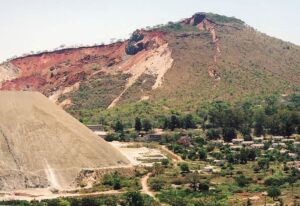Brenna Matendere
Gweru—One of President Emmerson Mnangagwa’s sons, Collins, is the chairman and senior partner in a gold company, Chengxi Mining (Pvt) Ltd, which has been causing environmental havoc and committing labour rights violations in the Midlands province, it has emerged.
While there has been speculation about his involvement in Chengxi Mining for some time, the cat was let out of the bag recently when the company handed over the renovated ruling Zanu PF district offices in the mining town of Shurugwi.

The offices upgrade included re-roofing, repainting, a new driveway and the installation of glazed windows.
Speaking at the handover ceremony, which was attended by the Midlands Provincial Affairs and Devolution minister, Owen Ncube, the Chengxi general manager, Simon Karimanzira, named Collins Mnangagwa—who was also presented—as a senior partner in the company.
“You will be pleased to learn, ladies and gentleman, that my company’s senior partner and co-chairperson, myself and other Chengxi company and members, we are all sons and daughters of Midlands province (sic),” said Karimanzira.
He added: “My chairman, Engineer Collins Mnangagwa, is a person who has people at heart and strives to uplift them. So, as a company, we do projects that benefit people’s lives.”
The ownership of Chengxi has been kept a closely guarded secret.
It has taken long to directly identify Collins as part of the company that, according to insiders, is co-owned by unnamed Chinese investors.
The Mnangagwa offspring and Karimanzira are the local faces of the mine.
“It’s worrying that politically exposed persons are part of the ownership and management of foreign-controlled companies like Chengxi. We have observed that Chinese and other companies operate with impunity because they are unduly protected by these persons,” Obert Chinhamo, the Anti-Corruption Trust of Southern Africa director, told this publication.
NewsHub has established that the mining claim in question was allocated to one Cephas Mahara, a ruling Zanu PF member, in 2005 and inherited by his younger brother, Chris, in 2021 when the former passed away.
In 2022, an unidentified Chinese team also mining at the nearby Wanderer Mine bought into Chengxi, which is operating on the once-scenic Boterekwa Escarpment also known as Wolfshall Pass.

Once the surviving Mahara’s shareholding became significantly reduced, Collins was roped in, ostensibly to backstop the project due to his political influence.
On average, insiders told this publication, the mine is producing 40kg of gold per week, with the highest weekly output so far being 66kg.
The average translates to close to US$3 million per week but there was a strong suspicion among employees and locals that Chengxi was not remitting all the gold to Fidelity Gold Refinery but, instead, smuggled some of it out of the country.
A research published by Information for Development Trust (IDT) last June observed: “There is suspicion within the community and among former workers that most of the gold is smuggled out of the country and little is sold to Fidelity,” says the report.”
The study exposed numerous environmental, socio-economic, legal and labour rights violations associated with Chengxi, a US$21 million investment that perches on a mineral-rich Achaean greenstone belt known as the Selukwe Schist Belt.
“A cross-section of the society that includes local people and environmentalists has largely accused Chengxi Mining (Pvt) Ltd of disrespecting national laws and policy frameworks,” reads the IDT report.
At one time, it noted, Chengxi was fined by the Environmental Management Agency (EMA) for operating without the requisite impact assessment certificate.
The report also established that company management ill-treated and underpaid workers, forcing them to operate without protective clothing at times.
While the mine had been issued with a licence for underground mining, participants in the research said, the company had instead adopted opencast mining whereby it removed surface soil for leaching purposes, thereby contributing to soil erosion.
The illegal opencast mining is contributing to the razing down of the escarpment that used to be a key tourist attraction, denuding the mountain and causing massive deforestation as well as downslope siltation of nearby rivers.
Even though the company now employs more than 150 ordinary workers, members from local communities complained that the majority of them were from outside the district.
When the Chinese took over, adds the report, more than 500 artisanal and small-scale miners were booted out.
In contrast, Chengxi’s counterparts in the area, the Anglo-American-owned Unki Mine, is strictly preserving the environment on which it is mining platinum.
Unki has constructed state-of-the-art roads, refurbished the Gweru provincial hospital, constructed Chinyika Clinic in Shurugwi and built houses for its employees.
In June last year, the then Minister of Environment, Nqobizitha Mangaliso Ndlovu toured Boterekwa and expressed shock at the extent of land degradation by companies such as Chengxi.
He ordered the Joint Operations Command (JOC) chapter in the Midlands province to look into the issue but no action has been taken to stop the land degradation.


Comments are closed.